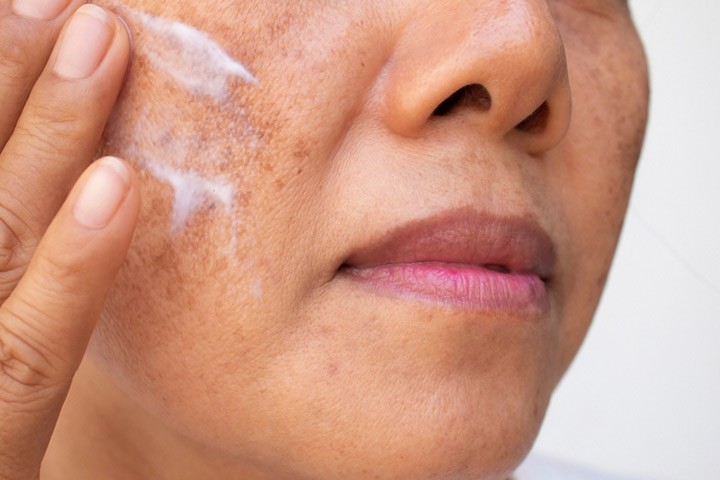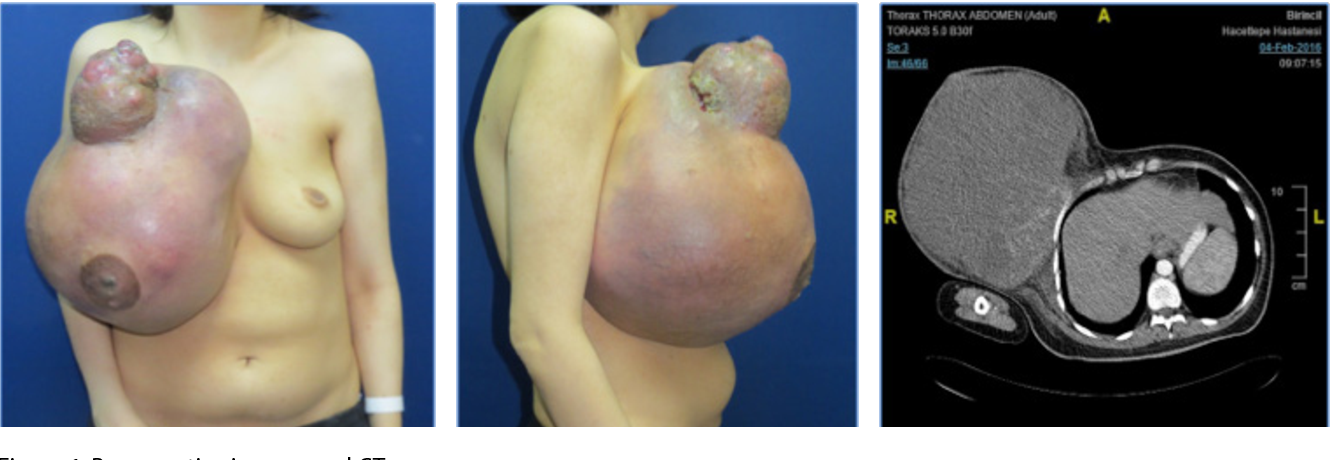Melasma
Melasma is a very common acquired skin disorder causing brown and dark discoloration of skin,
especially on the face. It affects mostly on the women though men can also develop this condition. It is
mostly common in pregnant women, so it is also termed as mask of pregnancy. Commonly affected
facial areas are forehead, bridge of nose, check, chin and upper lip. It may also appear on the
forehands, neck and shoulders in some cases. When it affects on face, it appears symmetrically. The
people who are lot more exposed to the sunlight are in the risk line of Melasma.

Pregnancy Melasma
Signs and Symptoms
The dark discolored spots or patches on the skin mostly on the face are the primary sign and symptom
of Melasma. Such spots are darker than the surrounding skins. Depending upon the severity, the color
may be from brown to black. They usually appear on the forehead, cheeks, bridge of nose, chin and
upper lip symmetrically but rarely on the forehands, neck, back and shoulders. Aside from discoloration,
they never itch, burn or hurt or they never create any physical problem. Affected person may not feel
any differences other than the change in color. However, melasma can degrade the facial appearance,
so the person may feel embarrassed losing self confidence.
Causes and Risk Factors
The main cause of the melasma is still unknown. It is believed that overproduction of melanin when skin
is exposed to the sun, making the pigment be deposited in the mostly uppermost layer of skin. It is also
said that dysregulation of certain hormones in the body and overexposure to direct sunlight can cause
the melasma, but every person may not be affected. However, there are some risks or triggering factors
that can cause to develop melasma:
Overexposure to Sunlight: The person exposing to sunlight for a longer period can develop
melasma. Sun’s ultraviolet ray triggers the melonocytes to produce more melanin. So, melasma
is more visible in summer months than in winter times.
Pregnancy: There is a huge chance that pregnant women can develop melasma. During later
phase of pregnancy, women develop high level of estrogen, progesterone, and melanocyte-
stimulating hormones, which lead to overproduction of melanin.
Complexion: People with dark complexion are more prone to develop melasma than people
with lighter complexion.
Hormones: Melasma is more common in women than in men. Studies show that increased
estrogen hormones can raise the chance of developing melasma. Postmenopausal women
getting progesterone hormone replacement therapy are also at a higher risk of developing
melasma.
Thyroid issues: People with thyroid issues are also prone to melasma. As the thyroid is
responsible for producing certain hormones, the problem in thyroid can have dysregulation of
hormones.
Genetics: The ones who are genetically predisposed are at a higher risk of melasma. People
with family history of melasma can also have melasma.
Birth Control Pills: Oral contraceptive pills can elevate the level of estrogen and progesterone,
raising the risk of developing melasma.
Medications: Certain medications like anti-seizure medications and medicines which are more
sensitive for pigmentation can cause melasma. Certain cosmetic items which make skin more
sensitive to sun can cause melasma as well.
Stress: Stress can also cause increased production of melanocyte-stimulating hormone,
ultimately causing to have melasma.

Melasma Beforeandafter
Treatment and Cure
Melasma may fade away over time without any treatment in some cases. Primarily, the cause of the
melasma is sunlight exposure. Avoid or minimizing the sunlight exposure, melasma can be controlled.
Wearing high protection sunscreens, broad-rimmed hat, and least exposure to sunlight are the foremost
step to prevent from worsening of the melasma. Once the causatives of melasma are stopped, melasma
will get lightened itself. Melasma appears with the pregnancy and will disappear on its own after few
months of delivery. Likewise, if the causatives are the pills or other drugs, then melasma will get
disappeared after discontinuing those medicines, but melasma can be for a longer time or permanently
for some people. In such case, we can treat it clinically. Here we will discuss the some treatment
methods for melasma.
Hydroquinone: Hydroquinone is a first-line treatment for melasma. Hydroquinone is available
in the form of cream, gel, lotion. It can be applied directly to the affected areas to lighten the
pigmented skin. Depending on the severity, dermatologist can suggest mild or higher strength
hydroquinone based cream.
Corticosteroids and Tretinoin: Both corticosteroids and tretinoin help enhance to lighten the
color of melasma. These are available in the form of cream, gel and lotion. In some cases,
dermatologist may prescribe the combined form of hydroquinone, corticosteroid and tretinoin.
Such combination is called triple cream.
Other Topical Medications: Dermatologists also suggest azelaic acid or kojic acid to lighten the
pigmented skin.
Cosmetic Procedures: If medicinal treatment cannot cure the melasma, there are some other
cosmetic methods to get rid of the melasma. Dermatologists can perform chemical peel,
microdermabrasion, and laser treatments to treat the melasma.
Home Remedies: Orange peel paste, aloe vera gel, turmeric powder and milk, almond and
honey face pack, and triphala choornam (ayurvedic herb) are the examples of home remedies,
which are believed to be helpful for melasma.
The treatment of melasma may take a considerable time to be successful. When melasma is
successfully treated, it is essential to avoid triggering factors. Exposure to sunlight can cause recurrence
of melasma. It is highly recommended to avoid sun exposure, to wear hat in sun, and to wear an SPF
50+ sunscreen during the day, even if not outdoors for significant amount of time.
- Author of this article :
| Sajiv Shrestha |
- Article received on
Thu, Jul 30, 8:47 PM |
- published on
- August 14 , 2020 12:05PM








